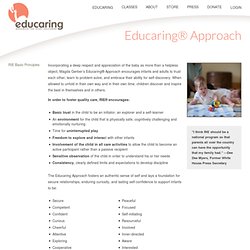

'I can do it!' Supporting babies' sense of agency - NQS PLP. Belinda George is an educator in an early learning service in Melbourne who also has responsibility for ongoing professional learning for her colleagues and is a part-time lecturer at TAFE.
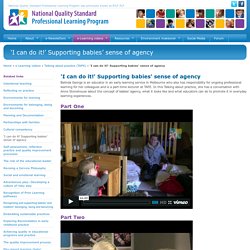
In this Talking about practice, she has a conversation with Anne Stonehouse about the concept of babies’ agency, what it looks like and what educators can do to promote it in everyday learning experiences. Part One Part Two Part Three FULL version How to Use this e-Learning Video. Infants’ understanding of their social world - OpenLearn - Open University - ED841_1. Researchers have long been interested in whether infants have a rich or poor understanding of their social world.
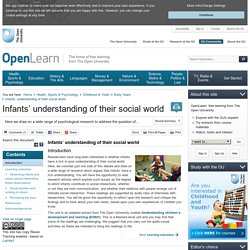
Here, we consider just one side of this debate and draw on a wide range of research which argues that infants’ have a rich understanding. You will have the opportunity to read research articles which explore such issues as the degree to which infants contribute to social interactions, whether or not they are born communicators, and whether their relations with people emerge out of intimate social interaction. These readings are supported by audio clips of interviews with researchers.
You will be given the opportunity to reflect upon the research and critique the findings and to think about your own views, based upon your own experiences of children you know. This unit is an adapted extract from The Open University module Understanding children’s development and learning (ED841)22 [Tip: hold Ctrl and click a link to open it in a new tab. Rhythm and Reflexes (or, Why We Rock Babies) By Kathy Fraser The dramatic rise in diagnoses of learning and behavioral “disorders” appears larger each year.

As an elementary teacher, I’m always watching for signs of learning difficulties and ways to address each students’ needs within the classroom day and with tools at hand. I was intrigued when I learned of certain therapeutic activities used in Waldorf curriculums that treated both academic and postural problems with patterned large motor skills. It led me to explore the connection between rhythmic movement and brain development. I discovered the work of Peter Blythe and Sally Goddard Blythe at the Institute for Neuro-physiological Psychology in England. Babies all over the world are genetically programmed to move their tiny bodies in specific ways. Read Baby’s First Month by movement specialist Valerie Baadh Garrett, on another blog on this site. The Social Womb. Caring for Infants and Toddlers in Groups.
J.

Ronald Lally, Ed.D., Far West Laboratory for Educational Research and Development, Sausalito California Yolanda Ledon Torres, Child Care Consultant, Pasadena, CaliforniaPamela C. Phelps, Ph.D., Creative Preschool, Tallahassee, Florida This article, edited for length, was based on a plenary presentation at ZERO TO THREE's 1993 National Training Institute in Washington, D.C. Www.highscope.org/file/NewsandInformation/Extensions/ExtVol26No6_lowrez.pdf. Helping children learn to share. Journal.naeyc.org/btj/200307/ChallengingOurAs.pdf. The Program for Infant/Toddler Care. The PITC Online Library houses an extensive collection of multimedia resources related to early childhood.
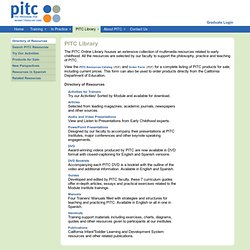
All the resources are selected by our faculty to support the philosophy, practice and teaching of PITC. View the PITC Resources Catalog (PDF) and Order Form (PDF) for a complete listing of PITC products for sale, including current prices. This form can also be used to order products directly from the California Department of Education. Toddler Behaviour in Child Care - The Issue of Sharing — EYLF Training. Toddler behavior is a topic widely written about.
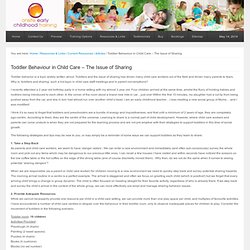
Toilet training. Learning to use the toilet is an important step in your toddler’s life.

Some toddlers get the knack quickly, while others need parental patience and support. Don’t start toilet training too early. Children usually reach two years of age before they can recognise and respond to toileting signals such as a full bladder. Premature toilet training will only frustrate you and upset your child, because they can’t do what you ask of them.
A child usually masters daytime toileting well before they can keep their bed dry at night. Avoiding stress over toilet training. Heuristic play. 5 Key principles of heuristic play. Infants and Toddlers meet the natural world. Cortisol in child care. Infants and Toddlers PD resource. Trusting baby to be a problem solver. Calmly setting and holding to necessary limits can be trying for parents, especially in the face of a toddler’s strong feelings of displeasure or upset.
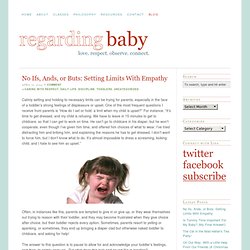
One of the most frequent questions I receive from parents is “How do I set or hold a limit when my child is upset?” For instance, “It’s time to get dressed, and my child is refusing. We have to leave in 15 minutes to get to childcare, so that I can get to work on time. He can’t go to childcare in his diaper, but he won’t cooperate, even though I’ve given him time, and offered him choices of what to wear. I’ve tried distracting him and bribing him, and explaining the reasons he has to get dressed. Often, in instances like this, parents are tempted to give in or give up, or they wear themselves out trying to reason with their toddler, and they may become frustrated when they give choice after choice, but their toddler rejects every option. Sarah writes: “I think I just had an epiphany. ANYWAY, that’s not what my epiphany was. The Curse of Respectful Parenting. Posted by janet on Aug 29th, 2013 The younger the child, the harder it is for her to show us who she is and to communicate her needs and capabilities.

This means babies are ripe for our projections. What we see – or what we think we see – informs our responses. This is important stuff, because the manner in which we engage our children determines their core self-image and charts the course of our parent – child relationship. But aren’t babies just babies? Here are two one-minute video clips that answer that question. Magda Gerber has described the basis of her approach, Harvey Karp demonstrates his here… What do you think? 2/19/14 update: I find it interesting that the above video of Dr. For further reading/viewing: Magda Gerber’s clip “Seeing Babies Differently” is from Seeing Infants With New Eyes, which is available on DVD at rie.org.
Educare. Incorporating a deep respect and appreciation of the baby as more than a helpless object, Magda Gerber’s Educaring® Approach encourages infants and adults to trust each other, learn to problem solve, and embrace their ability for self-discovery.
